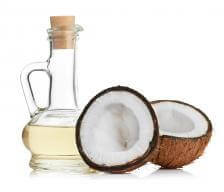What Are the Benefits of Coconut Oil?
Coconut oil has twice the saturated fat of butter, yet many are extolling it as a miracle food. What gives?

What are the Benefits of Coconut Oil?
Several of you have written me to ask about the benefits of coconut oil after coming across articles about it online and elsewhere. To hear some tell it, coconut oil may have the power to save us from all that ails us. They cite research showing that it protects against heart disease, promotes weight loss, bolsters the immune system, contains valuable antioxidants, and is a powerful antiviral agent. Proponents suggest that you replace your regular oil with extra virgin coconut oil to harness all its tremendous benefits.
“Don’t do it!,” cry the folks at the National Heart, Lung and Blood Institute and the American Heart Association. Coconut oil contains more saturated fat than any other food–almost twice as much as in butter! Diets high in saturated fat, they point out, can raise your cholesterol and increase your risk of heart disease.
“Ah, yes,” retort the coconut nuts, “but the saturated fats in coconut oil are different than the saturated fats found in butter and meat. They behave completely differently in the body and we have studies to prove it.”
“Oh yeah?” say the saturated fat haters. “We’ll see your study and raise you two studies that show that some people who eat coconut oil actually have increased risk factors for heart disease!”
Insufficient Evidence about the Benefits of Coconut Oil
No wonder you’re not sure what to think about coconut oil. To tell you the truth, I’m not entirely sure what to think either. If you’re looking for a definitive ruling, I’m afraid I may have to disappoint you on this one.
The truth is that the existing research on how coconut oil might interact with other dietary elements to promote or possibly threaten your health is limited, flawed, and contradictory. Anyone who claims to know with certainty that eating coconut oil will improve your health over the long term is either guessing, ignoring some of the evidence, or both.
For example, although it’s absolutely true that the saturated fats in coconut oil are different from the saturated fats in meat and butter, we don’t know for sure that this makes them good for your heart. There are studies suggesting they might lower risk factors for heart disease and other studies showing the exact opposite.
I’d also be remiss if I didn’t at least mention that some people question the notion that saturated fat causes heart disease at all.
Is Coconut Oil a Weight Loss Miracle?
There is also evidence to support the idea that coconut oil increases your metabolism. The question is whether the effect is really big enough to make much of a difference. If you’re looking for a weight loss miracle, keep looking.
Anyone who claims to know with certainty that eating coconut oil will improve your health over the long term is either guessing, ignoring some of the evidence, or both.
If you’re compelled by the argument that people eating traditional diets high in coconut oil have lower rates of heart disease, I’d like to point out that there are a lot of other things that might explain low rates of heart disease in traditional cultures. In addition to picking up a jar of coconut oil, you might also want to eliminate all processed and refined foods, grow and grind your own rice, walk ten miles to and from the market, and eat only enough to maintain a low to normal body weight.
One thing we can say for sure is that, because it is so high in saturated fats, coconut oil is extremely stable. Unlike polyunsaturated fats like corn or soybean oil, it does not easily oxidize, spoil, or go rancid. It also has a very high smoke point and does not produce harmful compounds when heated.
If you are heating oil to very high temperatures, such as for deep-fat frying, coconut oil may well be your best option. Then again, if you’re looking to improve your health or lose weight, you might not want to be doing all that much deep frying anyway.
The Bottom Line on Coconut Oil—For Now
The bottom line? Coconut oil may offer some health benefits and certain advantages over other cooking oils. But the jury is still out on the long-term effects of the saturated fats it contains. Here’s my considered opinion: When consumed in moderation and as part of a reasonable diet and lifestyle, coconut oil is probably neither a dietary devil nor a nutritional knight in shining armor. It’s just another small piece in the big puzzle.
I’ll end with a quote from Marion Nestle’s book What to Eat:
“The attention paid to single nutrients, to individual foods, and to particular diseases distracts from the basic principles of diet and health,” she writes. “You are better off paying attention to your overall dietary pattern than worrying about whether any one single food is better for you than another.”
Administrative
Be sure to sign up for my weekly email tips. If you have a question or a comment you can reach me on Facebook and Twitter.
Have a great day and eat something good for me!
RESOURCES
What if Bad Fat Isn’t So Bad? (MSNBC.com)
Coconut Oil: Diet Miracle or Fad? (WebMD)
Thoughts on Coconut Oil (George Mateljan Foundation)

